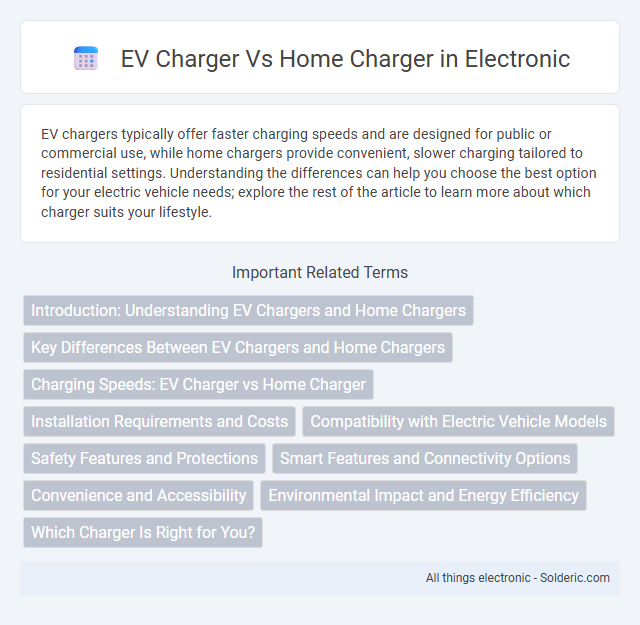EV chargers typically offer faster charging speeds and are designed for public or commercial use, while home chargers provide convenient, slower charging tailored to residential settings. Understanding the differences can help you choose the best option for your electric vehicle needs; explore the rest of the article to learn more about which charger suits your lifestyle.
Comparison Table
| Feature | EV Charger (Public) | Home Charger |
|---|---|---|
| Location | Public spaces, parking lots, commercial areas | Residential garages, driveways |
| Charging Speed | Fast to ultra-fast (50 kW to 350 kW) | Slow to fast (3.7 kW to 22 kW) |
| Installation | No installation needed by user | Professional installation required |
| Cost | Pay-per-use or subscription | One-time purchase and installation |
| Accessibility | Available to all EV users | Private use only |
| Power Source | High-capacity commercial power grid | Residential power supply |
| Convenience | Suitable for quick top-ups during travel | Ideal for overnight full charging |
Introduction: Understanding EV Chargers and Home Chargers
EV chargers encompass a broad category of devices designed to recharge electric vehicles, including public, fast, and home chargers, each differing in power output and charging speed. Home chargers specifically refer to Level 1 or Level 2 charging units installed at your residence, offering convenience for overnight charging with power outputs typically ranging from 3.7 kW to 22 kW. Understanding the distinctions between EV chargers and home chargers helps you select the ideal solution that balances charging time, cost, and accessibility for your electric vehicle.
Key Differences Between EV Chargers and Home Chargers
EV chargers, designed for public or commercial use, often deliver higher power levels, enabling faster charging compared to home chargers that typically provide lower voltage suitable for overnight charging. Home chargers prioritize convenience and safety within residential environments, featuring standard connectors compatible with most electric vehicles and integrated safety mechanisms to prevent electrical hazards. Your choice between an EV charger and a home charger depends on charging speed requirements, installation location, and power availability.
Charging Speeds: EV Charger vs Home Charger
EV chargers, particularly Level 3 DC fast chargers, offer rapid charging speeds, replenishing an electric vehicle's battery to 80% in as little as 20-40 minutes. In contrast, home chargers, usually Level 2 units, provide slower charging rates, typically adding 25-30 miles of range per hour, requiring 6-12 hours for a full charge depending on the battery capacity. Choosing between EV public chargers and home chargers depends on convenience and charging speed needs, with fast chargers suited for quick top-ups and home chargers ideal for overnight recharging.
Installation Requirements and Costs
EV chargers typically require professional installation involving dedicated electrical circuits, which can increase upfront costs depending on your home's existing wiring and electrical panel capacity. Home chargers, often Level 1 or Level 2 units, may need less extensive electrical upgrades, reducing installation complexity and expenses. To optimize your investment, assess your specific electrical infrastructure and consult a licensed electrician to determine the most cost-effective and compliant charging solution for your needs.
Compatibility with Electric Vehicle Models
EV chargers often offer broad compatibility across multiple electric vehicle models due to standardized connector types like CCS, CHAdeMO, and Tesla's proprietary plug. Home chargers typically provide versatile functionality compatible with most brands, supporting Level 1 and Level 2 charging standards for efficient battery replenishment. Ensuring compatibility with your EV model involves checking connector types and voltage requirements to optimize charging performance and safety.
Safety Features and Protections
EV chargers and home chargers both incorporate critical safety features such as overcurrent protection, ground fault detection, and temperature monitoring to prevent electrical hazards. Home chargers often include additional built-in safeguards tailored to residential environments, like surge protection and automatic shutoff mechanisms. Ensuring your charger meets these safety standards protects your electric vehicle and home from potential damage or fire risks.
Smart Features and Connectivity Options
EV chargers typically offer advanced smart features such as remote monitoring, scheduled charging, and energy usage reports via dedicated apps, enhancing convenience and efficiency for electric vehicle owners. Home chargers may include basic connectivity options like Wi-Fi or Bluetooth, enabling simple controls and updates but often lack the comprehensive management tools found in public EV charging stations. You can optimize your charging experience by selecting a charger with the right balance of smart features and connectivity tailored to your daily driving habits and home network capabilities.
Convenience and Accessibility
EV chargers typically offer faster charging speeds and are often found at public locations, providing convenience during travel and extended trips. Home chargers, installed in your garage or driveway, ensure accessibility whenever you need to recharge, eliminating the need to visit public stations. Choosing a home charger maximizes daily convenience, while public EV chargers enhance accessibility on the go.
Environmental Impact and Energy Efficiency
EV chargers generally have a lower environmental impact when powered by renewable energy sources compared to conventional home chargers that rely on grid electricity, which often includes fossil fuels. Public EV chargers often incorporate advanced energy-efficient technologies such as smart charging and demand response that optimize energy use and reduce carbon emissions. Home chargers offer convenience but may lack the energy management systems that enhance overall efficiency and sustainability in dedicated EV charging stations.
Which Charger Is Right for You?
Choosing between an EV charger and a home charger depends on your daily driving habits, charging speed needs, and installation options. Level 2 home chargers provide faster charging times than standard EV chargers, typically delivering 20-30 miles of range per hour, ideal for overnight charging. Public EV chargers offer convenience for longer trips but usually require higher upfront costs and depend on charger availability.
EV charger vs home charger Infographic

 solderic.com
solderic.com